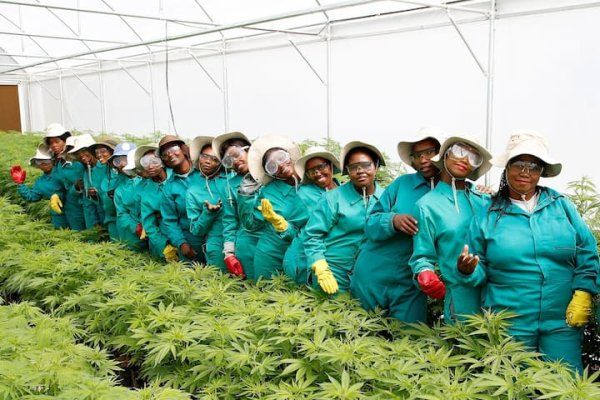It grows in sloping landscapes that in winter resemble the black of donkeys that traverse them in north-western Lesotho, in hard-to-access ravines and in people's front yards, alongside peas and spinach.
Despite legislation in 2008 that allowed medical or scientific cannabis cultivation in Lesotho, recreational cannabis cultivation remains illegal without a license from the health ministry.
Teboho Mohale had just completed high school when the first licenses were issued in 2017. Aside from the police station and the Maluti Adventist hospital, which employ a few people, there are few jobs in Mapoteng. Mohale planted matekoane (cannabis) and began selling it to locals. Five years later, he still doesn't have a licence and doubts he'll ever get one for 500,000 maloti (about £23,000).
According to him and other Basotho people who have grown cannabis for decades, only the elite and multinationals have benefited from the legislation that was hailed as a way for everyone to prosper.
By 2023, Lesotho's cannabis industry is expected to be worth $92 million (£76 million). However, Mohale and others say their plants take eight months to mature in open fields.
The only thing Mohale can do is sell the crop from his roadside stall, which also sells grilled chicken feet and gizzards. “Sometimes I get 600 maloti when I sell to locals for 5 maloti or 10 maloti,” he says.
Having poor customers who pay in drops, he prefers to sell his entire crop of 12.5kg of cannabis in Hlotse, a market town near the South African border, where he gets 500 maloti in one go - not enough to support his family.
In the years since the first marijuana cultivation license was issued, Lesotho's politicians have talked about opening up the industry to the benefit of ordinary citizens.
Emmanuel Letete, then an economist at the ministry for development planning, declared in 2019 that cannabis would "set the country free". Now the governor of the Central Bank of Lesotho, Letete says the industry hasn't lived up to expectations. As a result of the lack of resources, the government hasn't done much to improve the situation for cannabis farmers that are already outside the legal framework.
While the then prime minister Moeketsi Majoro called for partnerships between cannabis companies and communities, neither his government nor his party, the All Basotho Convention, succeeded in doing so. The then health minister, who is now opposition leader Nkaku Kabi, stated in 2018 that he was working to make the cannabis industry more accessible to Basotho. No strategy has been announced by the government or opposition in almost five years.
The first company to obtain a license in 2017 was Medigrow Health, which announced in 2021 that it was entering into a multimillion-pound deal to sell medicinal cannabis. Despite not responding to a Guardian interview request, its CEO, Andre Bothma, told Quartz Africa in 2019 that the company would employ the entire village of Marakabei, which is home to about 2,000 people.
In a country where almost a quarter of the population is unemployed, and 31% live below the poverty line, any job is significant.
The goal for Mohale is not employment. He wants to grow marijuana legally on his own land. He says he would have started already if not for the prohibitive cost of a government license.
New commercial companies, with international investors, have been popping up in Lesotho. In 2020, Morama Holdings started their operations at Ohala Matebele in Letsatsing. When the company launched, Majoro commended the investors for allocating a 20% stake to Basotho citizens. Despite this, Samuel Molemo, chief of the region, is not content that the Basotho shareholders don't come from the local area but rather Maseru.
As Africans, we need total control over our natural resources, especially cannabis, natural resources, and water, Molemo says. "We need to change our mindset when it comes to things that we own, like cannabis, natural resources, and water."
According to Molemo, the chief does not have any authority over people's personal land and payment issues because Lesotho does not sell (communal) soil.
According to Motelle Mokhethi, a professor at the University of Lesotho, some of these companies give landowners a lump sum to establish plants.
Lesotho's long history with cannabis cultivation has been extensively documented by Dr Julian Bloomer, a professor at Mary Immaculate College in Ireland. In spite of hearing of the desire to assist those from the illicit cannabis sector to enter the medical cannabis sector, I haven't seen any plans on how this might happen.
Due to the high cost of licences, only those with access to capital have been able to enter the medical cannabis market.
Thato Polane, 21, has been hired by Morama Holdings to tend to plants. She earns 3,000 maloti ($179) a month. Far better than the 500 maloti ($30) she earned as a cleaner.
As compared to her two friends, Nyefolo Mathinya, 31, and Liteboho Thamahane, 23, who go to the cannabis plant every day to find work, Mathinya is lucky. As Mathinya explains, she wakes up every morning with the chickens to walk there. Even though she is tired, she won't give up. Unlike many young people in Lesotho, they have never been employed formally, and cannabis farms are the first industry in their lifetimes.
According to Morama Holdings' spokesperson, the company takes its community responsibility very seriously, which is why most of its team has been with it since it began operating.
Despite legislation in 2008 that allowed medical or scientific cannabis cultivation in Lesotho, recreational cannabis cultivation remains illegal without a license from the health ministry.
Teboho Mohale had just completed high school when the first licenses were issued in 2017. Aside from the police station and the Maluti Adventist hospital, which employ a few people, there are few jobs in Mapoteng. Mohale planted matekoane (cannabis) and began selling it to locals. Five years later, he still doesn't have a licence and doubts he'll ever get one for 500,000 maloti (about £23,000).
According to him and other Basotho people who have grown cannabis for decades, only the elite and multinationals have benefited from the legislation that was hailed as a way for everyone to prosper.
By 2023, Lesotho's cannabis industry is expected to be worth $92 million (£76 million). However, Mohale and others say their plants take eight months to mature in open fields.
The only thing Mohale can do is sell the crop from his roadside stall, which also sells grilled chicken feet and gizzards. “Sometimes I get 600 maloti when I sell to locals for 5 maloti or 10 maloti,” he says.
Having poor customers who pay in drops, he prefers to sell his entire crop of 12.5kg of cannabis in Hlotse, a market town near the South African border, where he gets 500 maloti in one go - not enough to support his family.
In the years since the first marijuana cultivation license was issued, Lesotho's politicians have talked about opening up the industry to the benefit of ordinary citizens.
Emmanuel Letete, then an economist at the ministry for development planning, declared in 2019 that cannabis would "set the country free". Now the governor of the Central Bank of Lesotho, Letete says the industry hasn't lived up to expectations. As a result of the lack of resources, the government hasn't done much to improve the situation for cannabis farmers that are already outside the legal framework.
While the then prime minister Moeketsi Majoro called for partnerships between cannabis companies and communities, neither his government nor his party, the All Basotho Convention, succeeded in doing so. The then health minister, who is now opposition leader Nkaku Kabi, stated in 2018 that he was working to make the cannabis industry more accessible to Basotho. No strategy has been announced by the government or opposition in almost five years.
The first company to obtain a license in 2017 was Medigrow Health, which announced in 2021 that it was entering into a multimillion-pound deal to sell medicinal cannabis. Despite not responding to a Guardian interview request, its CEO, Andre Bothma, told Quartz Africa in 2019 that the company would employ the entire village of Marakabei, which is home to about 2,000 people.
In a country where almost a quarter of the population is unemployed, and 31% live below the poverty line, any job is significant.
The goal for Mohale is not employment. He wants to grow marijuana legally on his own land. He says he would have started already if not for the prohibitive cost of a government license.
New commercial companies, with international investors, have been popping up in Lesotho. In 2020, Morama Holdings started their operations at Ohala Matebele in Letsatsing. When the company launched, Majoro commended the investors for allocating a 20% stake to Basotho citizens. Despite this, Samuel Molemo, chief of the region, is not content that the Basotho shareholders don't come from the local area but rather Maseru.
As Africans, we need total control over our natural resources, especially cannabis, natural resources, and water, Molemo says. "We need to change our mindset when it comes to things that we own, like cannabis, natural resources, and water."
According to Molemo, the chief does not have any authority over people's personal land and payment issues because Lesotho does not sell (communal) soil.
According to Motelle Mokhethi, a professor at the University of Lesotho, some of these companies give landowners a lump sum to establish plants.
Lesotho's long history with cannabis cultivation has been extensively documented by Dr Julian Bloomer, a professor at Mary Immaculate College in Ireland. In spite of hearing of the desire to assist those from the illicit cannabis sector to enter the medical cannabis sector, I haven't seen any plans on how this might happen.
Due to the high cost of licences, only those with access to capital have been able to enter the medical cannabis market.
Thato Polane, 21, has been hired by Morama Holdings to tend to plants. She earns 3,000 maloti ($179) a month. Far better than the 500 maloti ($30) she earned as a cleaner.
As compared to her two friends, Nyefolo Mathinya, 31, and Liteboho Thamahane, 23, who go to the cannabis plant every day to find work, Mathinya is lucky. As Mathinya explains, she wakes up every morning with the chickens to walk there. Even though she is tired, she won't give up. Unlike many young people in Lesotho, they have never been employed formally, and cannabis farms are the first industry in their lifetimes.
According to Morama Holdings' spokesperson, the company takes its community responsibility very seriously, which is why most of its team has been with it since it began operating.




